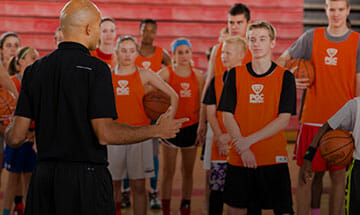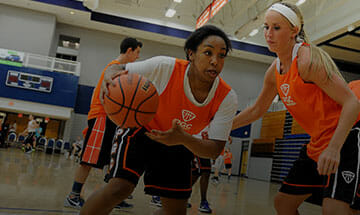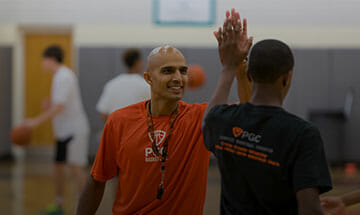Pavlovian Basketball
Basketball is a thinking game but, as a coach, one of your major responsibilities is to take as many situations as possible out of thought processes and turn them into quick reactions requiring no thought at all.
For example, when a player catches a basketball, you don’t want him thinking what to do, as though there are a lot of options. There is only one option. Look immediately, every time, to the basket. If there’s no shot and no one open, then some thinking can kick in. But not at first.
Same with rebounding. At some point a player has to decide whether or not to keep trying for a rebound, but not initially. The only acceptable reaction initially is for your big men to head to the basket immediately, every time.
Those words are key: immediately and every time. I think it makes sense for you to make a list of things that your players recognize as requiring instant reactions. This is what I call Pavlovian Basketball, because these things are as automatic as Dr. Pavlov’s dogs salivating at the sound of a bell.
The length of your list will have a lot to do with the degree of success you enjoy as a coach. A lot of things in basketball need no discussion and no thought. They must simply be trained as reactions. Here are some of my personal “instant salivations:”
- In practice, when my players hear a whistle, they stop. When they hear two whistles, they come running. If they see me point to a line, they sprint to it.
- In scrimmages and in games, a shot by the other team means hands up. (All five players, every time. Why not? It should remind them to start their block-out dance—hand up, seek someone to block out, make contact, go to the ball.)
- A shot by us brings immediate 3-2 movement for the rebound. (Explained in its own section.)
- A mistake means instant hustle.
- Frustration means pick up a teammate.
- Full court press. Get strong and precise.
- Loose ball? Grab it. Ball to chin, elbows out.
- We lose the ball, switch ends. (Don’t let athletes stand there gazing as though something unusual has happened. It’s amazing how many players do this.) The moment the other team gets the ball, fire a gun in practice, if you have to, to teach your players to react immediately.
This is by no means a complete list, but I think you get the idea. A good way to review the basics before a game is just to call out the situation and let your players call out the response. If they can do it verbally, it won’t be long before they can do it physically on the court—especially if you reinforce these things on the court immediately and every time in practice.
The more consistent you are, the more consistent your team will be. Dr. Pavlov didn’t hope his dogs salivated every time he rang a bell. He trained them until they salivated every time he rang a bell. The dogs’ reactions were involuntary, automatic—just the way you want your team’s to be.
How many times in the history of basketball has a coach corrected a player, only to hear the player say, “But Coach, I thought . . .”
The coach says, “Don’t think.” And maybe adds, “It’s a bad habit.”
Is it a bad habit for a player to think? Not in general, but it is a very bad habit to stand on a court thinking about what to do in a situation that happens a hundred times per game—like the need to switch ends— and needs no thought at all, just a quick reaction.
What’s on your Pavlov list? Let us know. How are you creating an immediate and every time response to the actions that require no thought by your athletes?
During our summer basketball camps, directors teach a progressive series of 1-minute drills that are designed to instill in athletes – championship habits – that can be used immediately and every time they compete and train.
Book excerpt from Dick DeVenzio’s book, Runnin’ The Show
Related Articles
5 Ways to Practice Mental Toughness
Here are five ways to practice your mental toughness off the court. If you practice these five things, every day, you’ll develop greater self-discipline. You’ll become unstoppable in anything you do. It is five things you will have to rise above your feelings every day. That is how you build mental toughness. You develop, as a habit, a muscle of rising above your feelings to level of your aspirations and commitments.
Why Is My Performance Inconsistent?
Do you ever feel like your performance in games is consistently inconsistent? That you’re putting in the same hard work at practice every day, yet some days you play really well and others you don’t play well at all? If that’s you, you’re not alone. If that’s not you, don’t worry—the frustration is coming soon!
Quit Being So Hard to Coach
COACHES HAVE FAVORITES!! Of course, they have favorites—their favorites are the players they can trust, on and off the court.
Here are four reasons you may not be getting the playing time you think you deserve.
About PGC
PGC Basketball provides intense, no-nonsense basketball training for players and coaches. Our basketball camps are designed to teach players of all positions to play smart basketball, be coaches on the court, and be leaders in practices, games and in everyday life.
We combine our unique PGC culture with a variety of teaching methods and learning environments to maximize the learning potential of those that attend our sessions. In addition to spending 6-7 hours on the court each day, lessons will be reinforced through classroom sessions and video analysis.
Our goal at PGC is to empower you with the tools to fulfill your basketball dreams, while also assisting you in experiencing the joy of the journey.
To learn more about PGC Basketball, including additional basketball training tips and videos, visit our YouTube Channel or find us on Facebook, Instagram, and Twitter.













Share This Post